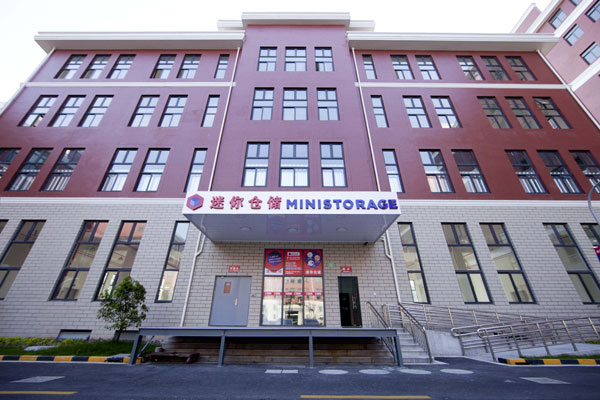
Louis Hill, a representative of Drivers Jonas Deloitte, said: "The service is becoming increasingly popular as people get used to it. The main reason why people like self storage is because it is flexible, trustworthy and convenient. There's likely to be a great future for self storage in China as it gives lifestyle flexibility and convenience."
For individual consumers, they mostly use small and medium-sized storages to keep files, such as financial documents and personal items, Luo said.
 |
|
A Ministorage facility in Shanghai. The self-storage company has been in operation in the metropolis for about two years. Provided to China Daily |
Festivals also tend to bring in more business. Customers will store their personal belongings for two or three weeks while on vacation and retrieve them when they return, she added.
"Self storage in Shanghai is growing so rapidly that we analyze the industry regularly. Our manager often goes to Shenzhen, Hong Kong and Japan to conduct market research. We are also planning to set up a branch in Beijing. Our expansion plan is focused on first-tier cities, where there are more wealthy consumers who need such a service," she said.In the West, the self-storage industry is already in full swing.
Maximilian Spitzy, general manager of Ministorage in Shanghai, said: "In the United States, you can expect to have one storage unit per 4,000 square meters. In the late 1990s, we introduced the idea of self storage to Europe. In 2008, we decided to bring the concept to China."
The company already has 35 self-storage facilities with a total of more than 250,000 square meters of storage in German-speaking Europe.
Learning from his peers' experience in Hong Kong, Spitzy decided the company had to buy its own property in the Chinese mainland when entering the market.
"Property prices in Hong Kong have risen so much that self-storage companies can't survive if they transfer that burden to customers. Therefore, we will always have our own property," he said.
Since Ministorage owns its properties, it can make building design decisions. Customers will also have more faith the company will not move or run away, Spitzy explained.
The current property that Ministorage owns in Shanghai is about 5,000 square meters, and the company plans to buy another two in the city. First-tier cities, such as Guangzhou, Shenzhen and Beijing, are also potential targets for expansion.
In Europe, 70 percent of self-storage customers are private individuals, with business people accounting for the rest. But in Asia, it's the other way around, with business accounting for 60 percent and individuals 40 percent, Spitzy said.
"There are more entrepreneurs and small companies in China. For a new startup, they don't want to spend a lot of money on a warehouse. So they rent 10 to 20 sq m at a self-storage company instead. We have many different customers. For example, China Mobile is one of our customers. They rented 100 sq m for server equipment," he said.







